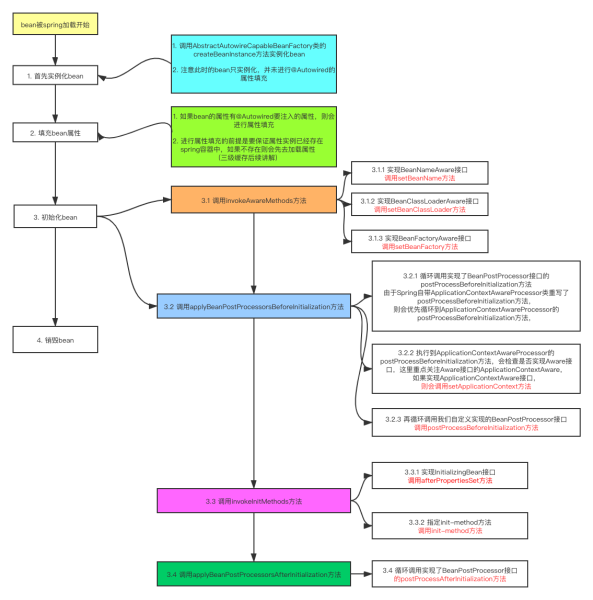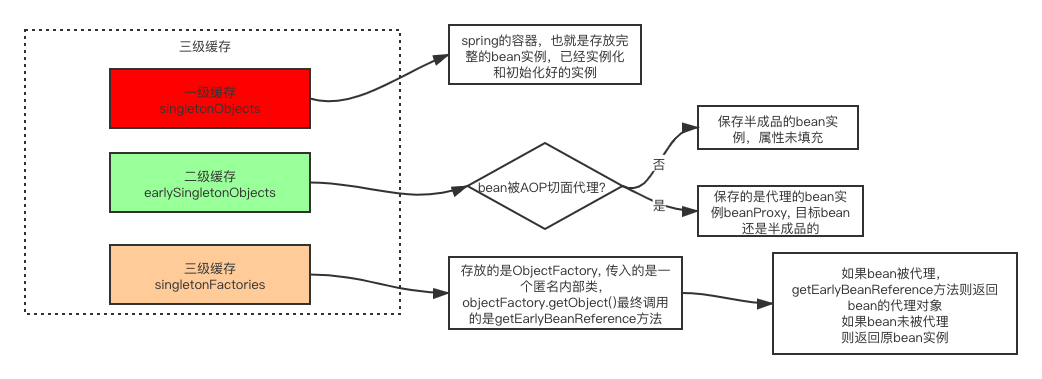Spring5學習之基礎知識總結
1.概述
1、Spring 是輕量級的開源的 JavaEE 框架
2、 Spring 可以解決企業應用開發的復雜性
3、Spring 有兩個核心部分:IOC 和 Aop
IOC:控制反轉,把創建對象過程交給 Spring 進行管理Aop:面向切面,不修改源代碼進行功能增強
4、Spring 特點
方便解耦,簡化開發Aop 編程支持方便程序測試方便和其他框架進行整合方便進行事務操作降低 API 開發難度
2.入門Demo
1.jar包引入
<project xmlns="http://maven.apache.org/POM/4.0.0"
xmlns:xsi="http://www.w3.org/2001/XMLSchema-instance"
xsi:schemaLocation="http://maven.apache.org/POM/4.0.0 https://maven.apache.org/xsd/maven-4.0.0.xsd">
<modelVersion>4.0.0</modelVersion>
<groupId>cn.zj.springDemo</groupId>
<artifactId>springDemo</artifactId>
<version>0.0.1-SNAPSHOT</version>
<description>spring的入門demo</description>
<dependencies>
<dependency>
<groupId>org.springframework</groupId>
<artifactId>spring-core</artifactId>
<version>5.3.6</version>
</dependency>
<dependency>
<groupId>org.springframework</groupId>
<artifactId>spring-beans</artifactId>
<version>5.3.6</version>
</dependency>
<dependency>
<groupId>org.springframework</groupId>
<artifactId>spring-context</artifactId>
<version>5.3.6</version>
</dependency>
</dependencies>
</project>
2.bean
package cn.zj.demo.bean;
public class User {
public void add() {
System.out.println("add....");
}
}
3.spring的xml配置
<?xml version="1.0" encoding="UTF-8"?>
<beans xmlns="http://www.springframework.org/schema/beans"
xmlns:xsi="http://www.w3.org/2001/XMLSchema-instance"
xsi:schemaLocation="http://www.springframework.org/schema/beans http://www.springframework.org/schema/beans/spring-beans.xsd">
<!--1 配置User對象創建-->
<bean id="user" class="cn.zj.demo.bean.User"></bean>
</beans>
4.測試代碼
package cn.zj.demo.test;
import org.junit.jupiter.api.Test;
import org.springframework.context.ApplicationContext;
import org.springframework.context.support.ClassPathXmlApplicationContext;
import cn.zj.demo.bean.User;
public class SpringTest {
@Test
public void testAdd() {
// 1 加載 spring 配置文件
ApplicationContext context = new ClassPathXmlApplicationContext("bean1.xml");
// 2 獲取配置創建的對象
User user = context.getBean("user", User.class);
System.out.println(user);
user.add();
}
}
5.輸出
cn.zj.demo.bean.User@24111ef1 add....
3.源碼
ApplicationContext context = new ClassPathXmlApplicationContext("bean1.xml");
public ClassPathXmlApplicationContext(
String[] configLocations, boolean refresh, @Nullable ApplicationContext parent)
throws BeansException {
super(parent);
setConfigLocations(configLocations);
if (refresh) {
refresh();
}
}
public void refresh() throws BeansException, IllegalStateException {
synchronized (this.startupShutdownMonitor) {
StartupStep contextRefresh = this.applicationStartup.start("spring.context.refresh");
//容器刷新前的準備,設置上下文狀態,獲取屬性,驗證必要的屬性等
prepareRefresh();
//獲取新的beanFactory,銷毀原有beanFactory、為每個bean生成BeanDefinition等
ConfigurableListableBeanFactory beanFactory = obtainFreshBeanFactory();
// Prepare the bean factory for use in this context.
prepareBeanFactory(beanFactory);
try {
//配置標準的beanFactory,設置ClassLoader,設置SpEL表達式解析器,添加忽略註入的接口,添加bean,添加bean後置處理器等
postProcessBeanFactory(beanFactory);
// 實例化並調用所有註冊的beanFactory後置處理器(實現接口BeanFactoryPostProcessor的bean,在beanFactory標準初始化之後執行)。
StartupStep beanPostProcess = this.applicationStartup.start("spring.context.beans.post-process");
// Invoke factory processors registered as beans in the context.
invokeBeanFactoryPostProcessors(beanFactory);
//實例化和註冊beanFactory中擴展瞭BeanPostProcessor的bean。
registerBeanPostProcessors(beanFactory);
beanPostProcess.end();
//初始化國際化工具類MessageSource
initMessageSource();
//初始化事件廣播器
initApplicationEventMulticaster();
//模板方法,在容器刷新的時候可以自定義邏輯,不同的Spring容器做不同的事情。
onRefresh();
//註冊監聽器,廣播early application events
registerListeners();
//實例化所有剩餘的(非懶加載)單例
//實例化的過程各種BeanPostProcessor開始起作用。
finishBeanFactoryInitialization(beanFactory);
//refresh做完之後需要做的其他事情。
//清除上下文資源緩存(如掃描中的ASM元數據)
//初始化上下文的生命周期處理器,並刷新(找出Spring容器中實現瞭Lifecycle接口的bean並執行start()方法)。
//發佈ContextRefreshedEvent事件告知對應的ApplicationListener進行響應的操作
finishRefresh();
}
catch (BeansException ex) {
if (logger.isWarnEnabled()) {
logger.warn("Exception encountered during context initialization - " +
"cancelling refresh attempt: " + ex);
}
// Destroy already created singletons to avoid dangling resources.
destroyBeans();
// Reset 'active' flag.
cancelRefresh(ex);
// Propagate exception to caller.
throw ex;
}
finally {
// Reset common introspection caches in Spring's core, since we
// might not ever need metadata for singleton beans anymore...
resetCommonCaches();
contextRefresh.end();
}
}
}

三級緩存

到此這篇關於Spring5學習之基礎知識總結的文章就介紹到這瞭,更多相關Spring5知識總結內容請搜索WalkonNet以前的文章或繼續瀏覽下面的相關文章希望大傢以後多多支持WalkonNet!
推薦閱讀:
- Java Spring框架創建項目與Bean的存儲與讀取詳解
- 詳解Spring容器的使用流程
- 一篇文章帶你Java Spring開發入門
- Spring概述和快速構建的方式
- Spring中Xml屬性配置的解析全過程記錄